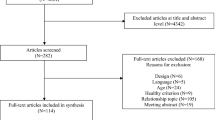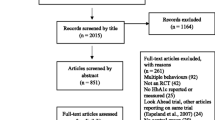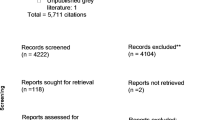Abstract
Current recommendations, based on an abundance of empirical data documenting the impact of physical activity (PA) on preventing morbidity and mortality associated with common chronic diseases, indicate that adults should accumulate 30 minutes of moderate-intensity PA ≥5 days per week. However, worldwide rates of PA remain low, indicating a great need for large-scale implementation of evidence-based PA interventions. We briefly present practical aspects of intervention planning, implementation and evaluation within common community settings.
The first stage of intervention planning is formative research, which allows for a better understanding of the elements needed for a successful intervention. Partnering with community settings (schools, worksites, faith-based organizations and healthcare organizations) offers many benefits and the opportunity to reach specific populations. Setting-based approaches allow for multilevel strategies, ranging from individual-based programmes and educational initiatives to physical and social environmental changes. Various settings such as healthcare, worksite, and school- and community-based settings are discussed. Intervention delivery methods and strategies can range, depending on the population and setting targeted, from small-group approaches to mediated methods (e.g. print, telephone, electronic).
The final phase of intervention planning and implementation is evaluation. Several objective and subjective methods of PA assessment are available to determine the effectiveness of the intervention. We have highlighted the need for process evaluation of intervention implementation to provide valuable information for the dissemination and sustainability of successful interventions. Although there are numerous considerations for the design, implementation, assessment and evaluation of PA interventions, the potential for positive impact on the overall health of the public indicates the necessity for programmes designed to increase PA.



Similar content being viewed by others
References
World Health Organization. Global strategy on diet, physical activity and health. Geneva: World Health Organization, 2004 [online]. Available from URL: http://www.who.int/dietphysicalactivity/strategy/eb11344/strategyenglish_web.pdf [Accessed 2009 Feb 2]
US Department of Health and Human Services. Physical activity and health: a report of the Surgeon General. Atlanta (GA): Centers for Disease Control and Prevention, National Center for Chronic Disease Prevention and Health Promotion, The President’s Council on Physical Fitness and Sports, 1996 [online]. Available from URL: http://www.cdc.gov/nccdphp/sgr/pdf/chap2.pdf [Accessed 2008 Mar 17]
Physical Activity Guidelines Advisory Committee. Physical activity guidelines advisory committee report, 2008. Washington, DC: US Department of Health and Human Services, 2008 [online]. Available from URL: http://www.health.gov/paguidelines/Report/pdf/CommitteeReport pdf [Accessed 2009 Mar 9]
Bryan SN, Tremblay MS, Perez CE, et al. Physical activity and ethnicity: evidence from the Canadian Community Health Survey. Can J Public Health 2006 Aug; 97(4): 271–6
Prevalence of regular physical activity among adults: United States, 2001 and 2005. MMWR Morb Mortal Wkly Rep 2007 Nov 23; 56(46): 1209–12
Bassett Jr DR, Pucher J, Buehler R, et al. Walking, cycling, and obesity rates in Europe, North America, and Australia. J Phys Act Health 2008; 5: 795–814
Martinez-Gonzalez MA, Varo JJ, Santos JL, et al. Prevalence of physical activity during leisure time in the European Union. Med Sci Sports Exerc 2001 Jul; 33(7): 1142–6
Haskell WL, Lee IM, Pate RR, et al. Physical activity and public health: updated recommendation for adults from the American College of Sports Medicine and the American Heart Association. Med Sci Sports Exerc 2007 Aug; 39(8): 1423–34
National Center for Chronic Disease Prevention and Health Promotion. Behavioral risk factor surveillance system. 2007 [online]. Available from URL: http://www.cdc.gov/brfss/ [Accessed 2008 Jan 18]
Troiano RP, Berrigan D, Dodd KW, et al. Physical activity in the United States measured by accelerometer. Med Sci Sports Exerc 2008 Jan; 40(1): 181–8
World Health Organization. World health report 2002: reducing risks, promoting health life. Geneva: World Health Organization, 2002 [online]. Available from URL: http://www.who.int/whr/2002/en/index.html [Accessed 2009 Feb 2]
Katzmarzyk PT, Gledhill N, Shephard RJ. The economic burden of physical inactivity in Canada. CMAJ 2000 Nov 28; 163(11): 1435–40
Katzmarzyk PT, Janssen I. The economic costs associated with physical inactivity and obesity in Canada: an update. Can J Appl Physiol 2004 Feb; 29(1): 90–115
Wang G, Pratt M, Macera CA, et al. Physical activity, cardiovascular disease, and medical expenditures in US adults. Ann Behav Med 2004 Oct; 28(2): 88–94
Colditz GA. Economic costs of obesity and inactivity. Med Sci Sports Exerc 1999 Nov; 31(11 Suppl.): S663–7
Allender S, Rayner M. The burden of overweight and obesity-related ill health in the UK. Obes Rev 2007 Sep; 8(5): 467–73
Muller-Riemenschneider F, Reinhold T, Willich SN. Cost-effectiveness of interventions promoting physical activity. Br J Sports Med 2009; 431: 70–6
Roux L, Pratt M, Tengs TO, et al. Cost effectiveness of community-based physical activity interventions. Am J Prev Med 2008 Dec; 35(6): 578–88
US Department of Health and Human Services. Centers for Disease Control and Prevention. National Center for Health Statistics (NCHS). National health and nutrition examination survey data, 2008 [online]. Available from URL: http://www.cdc.gov/nchs/nhanes.htm [Accessed 2008 Aug 4]
Centers for Disease Control and Prevention. National Center for Health Statistics (NCHS). National health and nutrition examination survey data, 2008 [online]. Available from URL: http://www.cdc.gov/nchs/nhanes.htm [Accessed 2008 Aug 4]
US Census Bureau. US Census Bureau State and County QuickFacts [online]. Available from URL: http://quickfacts.census.gov [Accessed 2008 Aug 4]
Gordon L, Graves N, Hawkes A, et al. A review of the cost-effectiveness of face-to-face behavioural interventions for smoking, physical activity, diet and alcohol. Chronic Illn 2007 Jun; 3(2): 101–29
Dishman RK, Buckworth J. Increasing physical activity: a quantitative synthesis. Med Sci Sports Exerc 1996; 28(6): 706–19
National Cancer Institute. Theory at a glance: a guide for health promotion practice. 2nd ed [NIH Publication No. 05-3896]. Washington, DC: US Department of Health and Human Services, 2005 [online]. Available from URL: http://www.cancer.gov/PDF/481f5d53-63df-41bc-bfaf-5aa48ee1da4d/TAAG3.pdf [Accessed 2009 Feb 2]
Marcus BH, Owen N, Forsyth LH, et al. Physical activity interventions using mass media, print media, and information technology. Am J Prev Med 1998 Nov; 15(4): 362–78
Resnicow K, Taylor R, Baskin M, et al. Results of go girls: a weight control program for overweight African-American adolescent females. Obes Res 2005 Oct; 13(10): 1739–48
Campbell MK, Denmark-Wahnefried W, Symons M, et al. Fruit and vegetable consumption and prevention of cancer: the black churches united for better health project. Am J Public Health 1999; 89(9): 1390–6
Yanek LR, Becker DM, Moy TF, et al. Project joy: faith based cardiovascular health promotion for African American women. Public Health Rep 2001; 116 Suppl. 1: 68–81
Dornelas EA, Stepnowski RR, Fischer EH, et al. Urban ethnic minority women’s attendance at health clinic vs. church based exercise programs. J Cross Cult Gerontol 2007 Mar; 22(1): 129–36
Peterson JA, Yates BC, Atwood JR, et al. Effects of a physical activity intervention for women. West J Nurs Res 2005 Feb; 27(1): 93–110
Simmons D, Fleming C, Voyle J, et al. A pilot urban church-based programme to reduce risk factors for diabetes among Western Samoans in New Zealand. Diabet Med 1998 Feb; 15(2): 136–42
McCallum Z, Wake M, Gerner B, et al. Outcome data from the LEAP (Live, Eat and Play) trial: a randomized controlled trial of a primary care intervention for childhood overweight/mild obesity. Int J Obes (Lond) 2007 Apr; 31(4): 630–6
Patrick K, Calfas KJ, Norman GJ, et al. Randomized controlled trial of a primary care and home-based intervention for physical activity and nutrition behaviors: PACE+ for adolescents. Arch Pediatr Adolesc Med 2006 Feb; 160(2): 128–36
Writing Group for the Activity Counseling Trial Research Group. Effects of physical activity counseling in primary care: the Activity Counseling Trial. A randomized controlled trial. JAMA 2001 Aug 8; 286(6): 677–87
Calfas KJ, Long BJ, Sallis JF, et al. A controlled trial of physician counseling to promote the adoption of physical activity. Prev Med 1996 May-Jun; 25(3): 225–33
Pinto BM, Lynn H, Marcus BH, et al. Physician-based activity counseling: intervention effects on mediators of motivational readiness for physical activity. Ann Behav Med 2001 Winter; 23(1): 2–10
Dutton GR, Davis Martin P, Welsch MA, et al. Promoting physical activity for low-income minority women in primary care. Am J Health Behav 2007 Nov-Dec; 31(6): 622–31
Eakin EG, Bull SS, Riley K, et al. Recruitment and retention of Latinos in a primary care-based physical activity and diet trial: The Resources for Health study. Health Educ Res 2007 Jun; 22(3): 361–71
Keyserling TC, Samuel Hodge CD, Jilcott SB, et al. Randomized trial of a clinic-based, community-supported, lifestyle intervention to improve physical activity and diet: The North Carolina enhanced WISEWOMAN project. Prev Med 2008 Jun; 46(6): 499–510
Wilcox S, Parra-Medina D, Thompson-Robinson M, et al. Nutrition and physical activity interventions to reduce cardiovascular disease risk in health care settings: a quantitative review with a focus on women. Nutr Rev 2001 Jul; 59(7): 197–214
Knowler WC, Barrett-Connor E, Fowler SE, et al. Reduction in the incidence of type 2 diabetes with lifestyle intervention or metformin. N Engl J Med 2002 Feb 7; 346(6): 393–403
Luepker RV, Perry CL, McKinlay SM, et al. Outcomes of a field trial to improve children’s dietary patterns and physical activity: The Child and Adolescent Trial for Cardiovascular Health. CATCH collaborative group. JAMA 1996 Mar 13; 275(10): 768–76
Shaya FT, Flores D, Gbarayor CM, et al. School-based obesity interventions: a literature review. J Sch Health 2008 Apr; 78(4): 189–96
Pate RR, Ward DS, Saunders RP, et al. Promotion of physical activity among high-school girls: a randomized controlled trial. Am J Public Health 2005 Sep; 95(9): 1582–7
Obarzanek E, Pratt CA. Girls health Enrichment Multi-site Studies (GEMS): new approaches to obesity prevention among young African-American girls. Ethn Dis 2003 Winter; 13(1 Suppl. 1): S1–5
Going S, Thompson J, Cano S, et al. The effects of the Pathways Obesity Prevention Program on physical activity in American Indian children. Prev Med 2003 Dec; 37(6 Pt 2): S62–9
Dishman RK, Oldenburg B, O’Neal H, et al. Worksite physical activity interventions. Am J Prev Med 1998 Nov; 15(4): 344–61
Proper KI, Hildebrandt VH, Van der Beek AJ, et al. Effect of individual counseling on physical activity fitness and health: a randomized controlled trial in a workplace setting. Am J Prev Med 2003 Apr; 24(3): 218–26
Plotnikoff RC, McCargar LJ, Wilson PM, et al. Efficacy of an e-mail intervention for the promotion of physical activity and nutrition behavior in the workplace context. Am J Health Promot 2005 Jul-Aug; 19(6): 422–9
Campbell MK, Tessaro I, DeVellis B, et al. Effects of a tailored health promotion program for female blue-collar workers: health works for women. Prev Med 2002 Mar; 34(3): 313–23
Young DR, Steckler A, Cohen S, et al. Process evaluation results from a school- and community-linked intervention: the Trial of Activity for Adolescent Girls (TAAG). Health Educ Res 2008; 23(6): 976–86
King AC. Interventions to promote physical activity by older adults. J Gerontol A Biol Sci Med Sci 2001 Oct; 56 Spec No 2: 36–46
Wilcox S, Dowda M, Griffin SF, et al. Results of the first year of active for life: translation of 2 evidence-based physical activity programs for older adults into community settings. Am J Public Health 2006 Jul; 96(7): 1201–9
Fahrenwald NL, Atwood JR, Walker SN, et al. A randomized pilot test of ‘Moms on the Move’: a physical activity intervention for WIC mothers. Ann Behav Med 2004 Apr; 27(2): 82–90
Chaudhary N, Kreiger N. Nutrition and physical activity interventions for low-income populations. Can J Diet Pract Res 2007 Winter; 68(4): 201–6
Yancey AK, Jordan A, Bradford J, et al. Engaging high-risk populations in community-level fitness promotion: ROCK! Richmond. Health Promot Pract 2003 April; 4(2): 180–8
Balcazar H, Alvarado M, Hollen ML, et al. Salud Para Su Corazon-NCLR: a comprehensive Promotora outreach program to promote heart-healthy behaviors among hispanics. Health Promot Pract 2006 Jan; 7(1): 68–77
Whitehorse LE, Manzano R, Baezconde-Garbanati LA, et al. Culturally tailoring a physical activity program for hispanic women: recruitment successes of La Vida Buena’s Salsa Aerobics. J Health Educ 1999; 30(2): s18–24
Grassi K, Gonzalez MG, Tello P, et al. La Vida Caminando: a community-based physical activity program designed by and for rural Latino families. J Health Ed 1999; 30(2): S13–7
Hovell MF, Mulvihill MM, Buono MJ, et al. Culturally tailored aerobic exercise intervention for low-income Latinas. Am J Health Promot 2008 Jan-Feb; 22(3): 155–63
Brownson RC, Baker EA, Boyd RL, et al. A community-based approach to promoting walking in rural areas. Am J Prev Med 2004 Jul; 27(1): 28–34
Brownson RC, Smith CA, Pratt M, et al. Preventing cardiovascular disease through community-based risk reduction: the Bootheel Heart Health Project. Am J Public Health 1996 Feb; 86(2): 206–13
Pargee D, Lara-Albers E, Puckett K. Building on tradition: promoting physical activity with American Indian Community coalitions. J Health Ed 1999; 30(2): s37–43
Marcus BH, Bock BC, Pinto BM, et al. Efficacy of an individualized, motivationally-tailored physical activity intervention. Ann Behav Med 1998 Summer; 20(3): 174–80
Talbot LA, Gaines JM, Huynh TN, et al. A home-based pedometer-driven walking program to increase physical activity in older adults with osteoarthritis of the knee: a preliminary study. J Am Geriatr Soc 2003 Mar; 51(3): 387–92
Nelson ME, Layne JE, Bernstein MJ, et al. The effects of multidimensional home-based exercise on functional performance in elderly people. J Gerontol A Biol Sci Med Sci 2004 Feb; 59(2): 154–60
Robinson TN, Kraemer HC, Matheson DM, et al. Stanford GEMS phase 2 obesity prevention trial for low-income African-American girls: design and sample baseline characteristics. Contemp Clin Trials 2008 Jan; 29(1): 56–69
Kreuter MW, Chheda SG, Bull FC. How does physician advice influence patient behavior? Evidence for a priming effect. Arch Fam Med 2000 May; 9(5): 426–33
Godin G, Shephard R. An evaluation of the potential role of the physician in influencing community exercise behavior. Am J Health Promot 1990; 4: 225–9
Australia Institute of Health and Welfare. Australia’s Health 2006: the tenth biennial health report of the Australian Institute of Health and Welfare [AIHW cat. no. AUS 73]. Canberra: AIHW, 2006 [online]. Available from URL: http://www.aihw.gov.au/publications/aus/ah06/ah06.pdf [Accessed 2009 Feb 2]
National Center for Health Statistics: United States. Health, United States, 2006 with Chartbook on Trends for the Health of Americans. Hyattsville (MD): National Center for Health Statistics, 2006 [online]. Available from URL: http://www.cdc.gov/nchs/data/hus/hus06.pdf [Accessed 2009 Mar 4]
Abramson S, Stein J, Schaufele M, et al. Personal exercise habits and counseling practices of primary care physicians: a national survey. Clin J Sport Med 2000 Jan; 10(1): 40–8
Livaudais JC, Kaplan CP, Haas JS, et al. Lifestyle behavior counseling for women patients among a sample of California physicians. J Womens Health (Larchmt) 2005 Jul-Aug; 14(6): 485–95
Elley R, Kerse N, Arroll B, et al. Cost-effectiveness of physical activity counselling in general practice. N Z Med J 2004 Dec 17; 117(1207):U1216
Lefebvre RC, Lasater TM, Carleton RA, et al. Theory and delivery of health programming in the community: the Pawtucket Heart Health Program. Prev Med 1987; 16(1): 80–95
Bopp M, Wilcox S, Laken M, et al. Using the RE-AIM framework to evaluate a physical activity intervention in churches. Prev Chronic Dis 2007 Oct; 4(4): A87
Wilcox S, Laken M, Bopp M, et al. Increasing physical activity among church members: community-based participatory research. Am J Prev Med 2007 Feb; 32(2): 131–8
Proper KI, de Bruyne MC, Hildebrandt VH, et al. Costs, benefits and effectiveness of worksite physical activity counseling from the employer’s perspective. Scand J Work Environ Health 2004 Feb; 30(1): 36–46
US Department of Health and Human Services. Promoting physical activity: a guide for community action. Champaign (IL): Human Kinetics, 1999
Task Force on Community Preventive Services. Recommendations to increase physical activity in communities. Am J Prev Med 2002; 22(4S): 67–72
Centers for Disease Control and Prevention. Guide to community preventive services. Physical activity [online]. Available from URL: http://www.thecommunityguide.org/pa/ [Accessed 2008 Aug 4]
Wilcox S, Ainsworth BE. The measurement of physical activity. In: Shumaker SA, Ockene JK, Riekert KA, editors. The handbook of health behavior change. 3rd ed. New York: Spring Publishing Company, 2009: 327–46
LaPorte RE, Montoye HJ, Caspersen CJ. Assessment of physical activity in epidemiologic research: problems and prospects. Public Health Rep 1985 Mar-Apr; 100(2): 131–46
Richardson MT, Leon AS, Jacobs Jr DR, et al. Comprehensive evaluation of the Minnesota Leisure Time Physical Activity Questionnaire. J Clin Epidemiol 1994 Mar; 47(3): 271–81
Fogelholm M, Malmberg J, Suni J, et al. International Physical Activity Questionnaire: validity against fitness. Med Sci Sports Exerc 2006 Apr; 38(4): 753–60
Murphy SL. Review of physical activity measurement using accelerometers in older adults: considerations for research design and conduct. Prev Med 2009 Feb; 48(2): 108–14
Reilly JJ, Penpraze V, Hislop J, et al. Objective measurement of physical activity and sedentary behaviour: review with new data. Arch Dis Child 2008 Jul; 93(7): 614–9
American College of Sports Medicine. American College of Sports Medicine guidelines for exercise testing and prescription. 7th ed. Philadelphia (PA): Lippincott Williams & Wilkins, 2005
Steckler A, Linnan L, editors. Process evaluation for public health interventions and research. San Francisco (CA): Jossey-Bass, 2002
Glasgow RE, Vogt TM, Boles SM. Evaluating the public health impact of health promotion interventions: the RE-AIM framework. Am J Public Health 1999 Sep; 89(9): 1322–7
Dzewaltowski DA, Glasgow RE, Klesges LM, et al. RE-AIM: evidence-based standards and a web resource to improve translation of research into practice. Ann Behav Med 2004 Oct; 28(2): 75–80
Acknowledgements
No sources of funding were used to assist in the preparation of this article. The authors have no conflicts of interest that are directly relevant to the content of this article.
Author information
Authors and Affiliations
Corresponding author
Rights and permissions
About this article
Cite this article
Bopp, M., Fallon, E. Community-based interventions to promote increased physical activity. Appl Health Econ Health Policy 6, 173–187 (2008). https://doi.org/10.1007/BF03256132
Published:
Issue Date:
DOI: https://doi.org/10.1007/BF03256132




